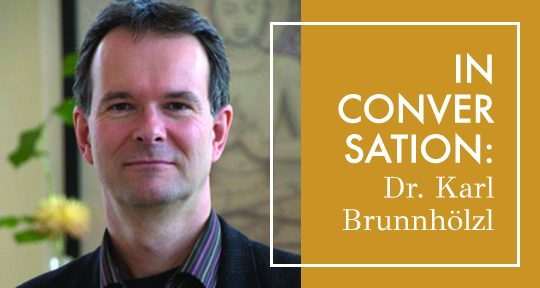The 2019 Khyentse Foundation Prize for Outstanding Translation was awarded to Dr. Karl Brunnhölzl for A Compendium of the Mahāyāna: Asaṅga’s Mahāyānasaṃgraha and Its Indian and Tibetan Commentaries (Shambhala Publications, 2018), a monumental three-volume work and the first complete English translation of the fourth century C.E. text. Originally written by a philosopher and spiritual teacher, it presents an extensive overview of the Yogācāra School of Mahāyāna Buddhism, which explores the nature of consciousness, existence, and spiritual practice.
Upon accepting the Khyentse Foundation Translation Prize, Dr. Brunnhölzl said, “I feel very honored and privileged to receive this award—more importantly though, the prize highlights the major significance of the entire Yogācāra tradition in general, as well as Asanga’s Mahāyānasaṃgraha, and specifically its commentarial tradition as being a major Indian Buddhist system of thought and practice that has been vastly influential over many hundreds of years in numerous countries. It is my wish that these volumes may be a small contribution toward Yogācāra receiving the attention and appreciation in the English-speaking world that it deserves.”
In light of the new wealth of knowledge that Dr. Brunnhölzl has made accessible to English readers, and with the wish that it reaches knowledge-seekers new and old, I gladly share this most timely and opportune correspondence.
Chime Lama (CL): Dr. Brunnhölzl, given that you were trained as a medical doctor, what made you shift your career path in favor of religious studies?
Karl Brunnhölzl (KB): Many people ask me that question, mostly because they find it strange to give up the well-respected, well-paid, and (mostly) beneficial profession of a physician in order to pursue something more “ethereal.” I became a Buddhist during my medical studies in 1983, and was even considering quitting to become a Buddhist translator, feeling that this was my true calling. However, my teacher gave me the good advice to finish medical school and study Buddhism afterwards, while having a solid financial footing. And so I did that for twenty years: working half the year as a doctor (in others’ clinics) and going to Nepal and India in pursuit of Buddhism for the other half. That proved to be a viable way of pursuing my religious studies, rather than having to quit due to lack of funding, like many others I know have had to do. READ MORE…

